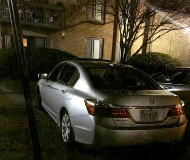4/28/2017
Virginia Supreme Court Says A Private Parking Lot Is Not A HighwayVirginia Supreme Court clears a man sleeping in a private parking lot of his conviction for refusing to take a drunk driving breath test.

A divided Virginia Supreme Court majority bucked the trend of courts expanding the reach of driving under the influence of alcohol (DUI) laws. The high court earlier this month refused to redefine a parking lot as a "highway" to extend the reach of the implied consent law to cover private property.
The justices made their decision in the case of Matthew Alexander Kim, who was asleep in his parked Honda Accord in the middle of the Avant Apartment complex in Annandale on March 11, 2015. It was a cool 41 degrees that early morning, so Kim's car was on to keep warm. Fairfax County Police Officer Richard Cash investigating the running car decided to force Kim to wake up. Kim appeared intoxicated and was eventually arrested and taken to the station where he refused to take a breath test. He was convicted of refusal and banned from driving for a year.
On appeal, Kim's lawyer pointed out that the state's implied consent statute only applies to a person who "operates a motor vehicle upon a highway," and a parking lot within a complex with "no trespassing" signs is not in any sense of the word a highway. The high court majority examined a long history of precedents and decided that a road that is not freely open to the use of the public cannot be considered a highway.
"We conclude that the presence of 'No Trespassing' signs at every vehicular entry point to the apartment complex necessarily restricts the public's access to the apartment complex as a whole," Justice Cleo E. Powell wrote for the majority. "Such a restriction axiomatically negates any consent to access the roads within the apartment complex that may be implied by the lack of physical barriers or the fact that the roads are named, paved, curbed, bordered by sidewalks and have posted traffic signs."
Justices D. Arthur Kelsey, Donald W. Lemons and Elizabeth A. McClanahan disagreed, insisting the trespassing sign was at an "inconspicuous angle," which they said makes all the difference.
"It is quite true that if the no-trespassing signs were clearly directed at motorists traveling on Nathan Hale Drive, then the most natural inference would be that the road was not open to the public," the dissenters wrote. "The trial court, however, rejected that inference."
The majority's view, however, prevailed and the charges against Kim were dropped. A copy of the ruling is available in a 300k PDF file at the source link below.


